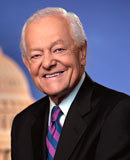September 15, 2015 — Bob Schieffer, Walter Shorenstein Media and Democracy Fellow, veteran CBS reporter and former moderator of “Face the Nation,” discussed the corrosive effects of money in politics and his outlook for the 2016 presidential election.
The current gridlocked political environment is “not the problem – it is a symptom of the problem of what’s happened in American politics and that is…a complete breakdown in our electoral system,” said Schieffer.
He compared President Lyndon B. Johnson’s campaign, which featured rallies organized by engaged citizens, to today’s campaigns, which are orchestrated by an “enormous industry” of campaign professionals.
“We used to say that campaigning and elections were the intervals between governing.” Today, said Schieffer, “governing is the interval between campaigns.”
Money is now “the driving force in American politics,” said Schieffer, with $7 billion spent in the last election, more than $1 billion spent by each candidate in the last presidential election, and super PACs becoming a campaign fixture.
By contrast, after the campaign finance abuses of the Nixon administration, 36 people were convicted of campaign finance violations, said Schieffer. “All of the things that those people were convicted of are now legal – secret donations, unlimited donations. What we have now, basically, is no campaign laws, and no finance laws.”
This flood of money into the political system has far-reaching implications beyond the election cycle. It has “put a distance” between candidates and their constituents, as campaigns rely on data from pollsters and focus groups, instead of encountering voters face to face in public rallies, said Schieffer. So much funding is now required for a successful run for Congress that candidates are “forced” to sign off with special interest groups, ensuring that when they arrive in Washington, their positions are “set in stone” with no room for compromise. Moderate members of either party have declined in number because of the pull of interest groups, harming the government’s ability to accomplish anything, said Schieffer.
Frustration with this current state of affairs has created an opportunity for outsider candidates such as Donald Trump and Ben Carson. Trump has made an “accurate list of all the things people are frustrated about…and he has enunciated that in very plain language,” which has resonated with people, said Schieffer. On the Democratic side, “the rise of Bernie Sanders is not that surprising – he talks like a real person” when compared to Hillary Clinton’s studied persona.
Schieffer said it’s “conceivable” that Trump could win the Republican nomination, or run as an independent without it. He also sees it being “entirely possible” that there would be four people in the presidential race: the Democratic and Republican nominees, with Donald Trump and Bernie Sanders running as independents.
In such a situation, Schieffer said it would be a longshot – but still possible – for Donald Trump or Bernie Sanders to be elected, as a candidate could win the presidency with only 35 percent of the vote.
“They say that every election is the most crucial election in modern history. I think this one may well be,” said Schieffer. “I think we are at a turning point in this country. We have got to find a way to get the government working again. This is not the way superpowers operate, and it is not the way that superpowers remain superpowers.”
Hear Schieffer discuss campaign finance reform, the presidential debates, campaign advertising and more in the full audio recording above.
Article by Nilagia McCoy of the Shorenstein Center, photo by Martha Stewart.


